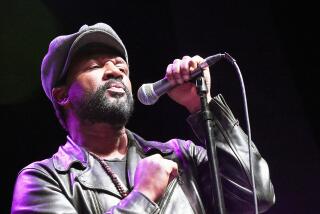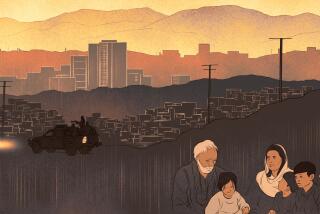Am I a terrorist?
Most people who are forced to travel by air have at least one good horror story; the 6,000 international passengers stranded at LAX on Aug. 11 have the exact same one. Airports have all the transient charm of purgatory, but for people like me, there’s an extra circle of hell for our traveling sins.
It begins the night before, when the online check-in system bounces me. The next day at the airport, the friendly self-serve kiosk informs me that there’s a problem with my registration and instructs me to speak with a live representative. I’ve gone through the ordeal so many times I can recite it from memory:
I hand the airline rep my ticket and ID. She presses a few keys, confused. Then comes the Frown. On occasion, there is a pursing of the lips. The rep then scurries into the back room for 20 minutes or so, while the disgruntled gazes of the travelers behind me bore into my shoulder blades. Finally, she comes back out and, without making eye contact, runs through a familiar litany of questions. Birthplace? San Jose. Occupation? Cal student. Hobbies? Blowing things up. Just kidding! Eventually she lets me through, and thanks to my mad sprinting-with-luggage skills, I barely catch the flight.
Strangely enough, nobody ever tells me why I always get the third degree. The airline employees feign ignorance or mumble something about “a problem with the records.” But one day - furious after another abortive check-in held up my bleary-eyed party of nine -- I interrogated a particularly frazzled airline employee, who finally snapped, “You’re on a no-fly list.”
Turns out he wasn’t quite right -- it’s probably not me who’s a suspected terrorist. It’s just that I, like Michael Martin, that cute little boy in Florida who also gets checked out when he checks in, have the misfortune of sharing a name with someone who is either on a no-fly list (barred from boarding a plane) or a “selectee” list (not banned, but nonetheless worrisome to the U.S. government). But because I’m not 7-years-old and adorable, nobody aside from my mother cares if I miss a flight.
Young Michael’s predicament with airline security became the travel-horror brouhaha du jour last month but, according to Christopher White of the Transportation Security Administration, that particular incident wasn’t actually the TSA’s fault. If children match a name on a list, they’re supposed to get an automatic pass -- it was the airline that bungled the enforcement.
That’s the fundamental problem with this decentralized security system - the TSA hands the airlines incomplete information, and the airlines then have to play policeman. The successes of TSA screening are rarely publicized, but the frustrations that this jerry-rigged system causes are seared into the minds of frustrated ordinary passengers.
Take the case of Asif Iqbal, then a 29-year-old software consultant who flew frequently for his job. Beginning in 2002, Iqbal was unable to board a plane. The computer would flash “Passenger Name on No-Fly List,” instruct the employee to call local law enforcement and then lock down and refuse to issue a boarding pass. The first time this happened, four deputy sheriffs came to question Iqbal, and he ended up missing a day of work. He came back the next day and was forced to go through the whole ordeal again, while being viewed with suspicion and irritation by his fellow travelers.
All this because his name matches a name on the no-fly list. The punchline? The poor guy’s watchlist-worthy namesake (whose ordeals were later made into a movie) was detained in Guantanamo at the time.
Here’s how the process works right now: At check-in, if your name matches a moniker on one of the watchlists, you’re tagged for extra screening. The airline employee will then call the TSA to verify your identity. If it turns out you’re not the terrorist they’re looking for, you’re deemed a “false positive” and allowed to go on. If your information can’t be vetted, you’re forced to go through more thorough questioning, further narrowing the chances that you’ll actually make your flight.
This system is the result of a hasty fix after 9/11, says Bruce Schneier, security expert, author and former member of a study group to prepare the federal Secure Flight program. The problem is that it relies on distributing information to airlines, which often don’t know how to use the data. In the case of Iqbal, the TSA put him on a “cleared” list of passengers and gave him a letter to show authorities. But for airline employees and law enforcement officials, the letter still didn’t make any difference - they didn’t know what it was and, after all, it could have been a forgery.
White said the TSA and the Terrorist Screening Center (TSC) have been working to cut down the watchlists by removing the names of the caught, the deceased or those otherwise unable to fly. Michelle Petrovich at the TSC said the lists have been cut down by 50% since last summer (in March 2006 there were 44,000 names on the no-fly list alone, according to a document leaked to “60 Minutes” -- up from 16 names on Sept. 10, 2001).
The TSA is working on a new system, Secure Flight, which would take the vetting process out of airlines’ hands and put it all in a centralized database. When passengers book their flights, they will provide such information as date of birth and gender, which will then be used to verify that person’s identity without (in theory) jeopardizing their privacy. With this system, that person’s name would be checked against cleared lists and vetted in one smooth motion, saving people the pain of suspicious looks and the agony of missed flights. Sounds good, no?
But it’s far from perfect. Some have attacked the new system as a scaled-back version of CAPPS II, which went down in flames in part because it would have also used individuals’ commercial data. Last year, the Government Accountability Office expressed concern that “without a completed system-security program, Secure Flight may not be adequately protected against unauthorized access and use or disruption, once the program becomes operational.”
Iqbal told me he remains skeptical about the security system. “What’s still unknown is, what’s the criteria for someone to get on a no-fly list ... you can be an activist or a terrorist,” he said. Meanwhile, he still gets delayed in airports; perhaps he has a new namesake on the list or something happened to the old one - the government won’t say. On the bright side, Iqbal said, it’s a lot “more automated now.”
So at least the new system should make things more convenient for me. That is, if it goes into effect at all - the start date has been pushed back to 2008 after several delays.
In the meantime, I’ll have to take matters into my own hands and send a “traveler redress” application to the Department of Homeland Security. With any luck, that’ll put me on the cleared list faster than you can say “no fly.” Unless they reject my application, of course.
I do have to admit that the idea of being dangerous enough to warrant federal attention does hold a certain James Dean-ish appeal to me. I see black motorcycle jackets in this future. But if I get one, just to make life easier for airline security, I’ll sew onto the front of it a scarlet “S” for “selectee.”
Amina Khan is an intern for the Editorial Pages. Send us your thoughts at [email protected]
More to Read
A cure for the common opinion
Get thought-provoking perspectives with our weekly newsletter.
You may occasionally receive promotional content from the Los Angeles Times.











